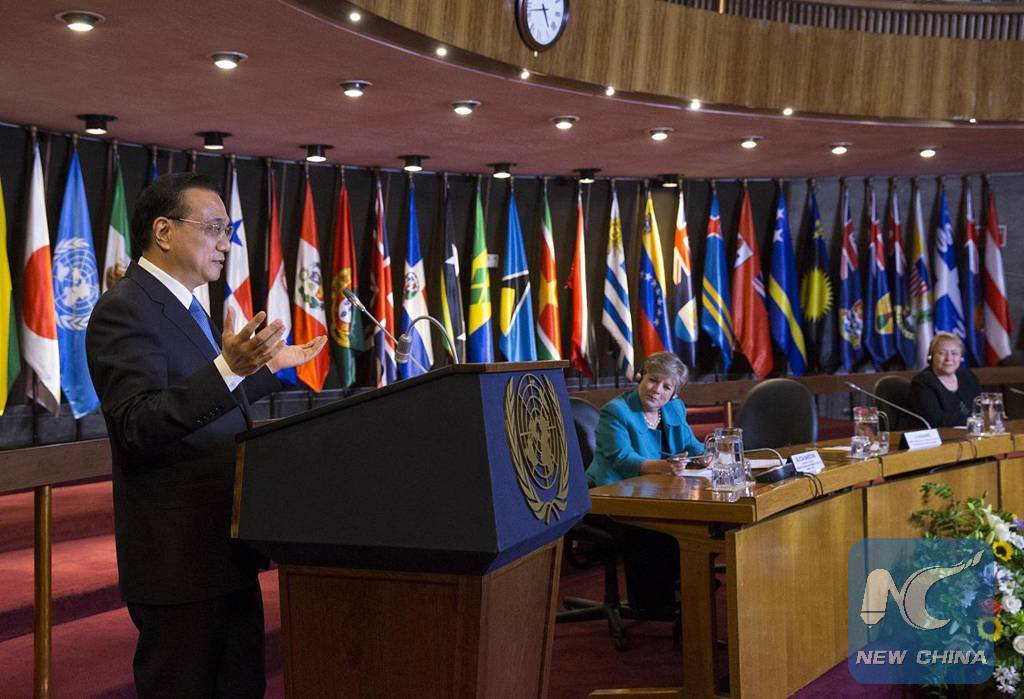
Analysis
16:50, 17-May-2019
Latin America wins big with China on trade, technology
Bertram Niles

Latin America's heavyweight nations have seen some immediate benefits from U.S. President Donald Trump's trade war against China, but there's general wariness in the region about the long-term impact of the tariff conflict between the world's two largest economies.
Last year, China increased imports of soybeans from Brazil to avoid tariffs applied by the United States, and Brazil exported a record 84 million tonnes.
And in a statement on Monday, the Center for Studies in Advanced Applied Economics in Sao Paulo said it expects that the demand from Beijing will continue to grow with the latest escalation of the U.S-China dispute.
Argentina also stands to benefit in the same way, though uncertainty over prices has caused unease among farmers in the country.
In addition, Brazil's JBS, the world's largest meatpacker, has boosted meat exports to China amid the tensions between Washington and Beijing. The company's share of exports to China rose to more than 24 percent last year from under 21 percent in 2017.
Economic growth fears
“We are prepared to take advantage of the trade war to increase our business with China and further build trade relations,” Igor Brandao, chief of the agribusiness division at Apex-Brasil, told the South China Morning Post this week on the sidelines of a food business exhibition in Shanghai.
But analysts and economists worry that these gains may be short term as a protracted trade conflict will harm economic growth, spook stock markets and put pressure on prices on commodities, where South America has shown strength.

Chinese Premier Li Keqiang delivers a speech at the Economic Commission for Latin America and the Caribbean (ECLAC), in Santiago, Chile, May 25, 2015. (Xinhua Photo)
Chinese Premier Li Keqiang delivers a speech at the Economic Commission for Latin America and the Caribbean (ECLAC), in Santiago, Chile, May 25, 2015. (Xinhua Photo)
“Nobody would be safe from a prolonged trade war,” Alberto Bernal, chief global strategist at Brazil's XP Securities, was quoted as saying on Thursday. “It would be like a huge flood. Some countries would be more flooded than others, but we would all be under water.”
Argentinian-born American syndicated columnist Andres Oppenheimer added another concern when he said, "Latin American countries would be further hurt by the fact that, in times of economic uncertainty, people in the region rush to buy U.S. dollars to protect themselves from currency devaluations. That weakens Latin American currencies, forces countries to hike interest rates and hurts their economic growth."
Latin America is caught right in the middle of the high stakes battle. It is in America's backyard, so to speak, so it has long-standing ties with Washington, but China has been making giant strides in its relations with the region within the past two decades.
Huawei makes Latin gains
In a report last December, the Atlantic Council said trade between China and Latin America has multiplied 18 times since 2000. "China," the report said, "has also become a source of finance for
the region, through both foreign direct
investment and lending – mostly for
infrastructure and energy. Increasing trade
and investment links have served both partners well, allowing China access to energy,
metals, and food to fuel growth, and
allowing Latin America – South American
countries in particular – to unlock a new driver of growth and poverty reduction."
The trade crisis has come at a delicate time for Latin America. The International Monetary Fund revised downward its already modest growth forecast in April just ahead of this month's imposition of new tariffs on Chinese imports by Trump and the promised retaliatory measures by China.
Complicating the trade issue is the situation regarding the Chinese telecoms behemoth Huawei, which has been making inroads in Latin America against the wishes of Trump, who has just effectively placed the company on an export blacklist that restricts their access to American suppliers. Huawei has vehemently rejected claims by Washington that it is a possible threat to U.S. security.
The firm has proved attractive to nations in Latin America, Africa and Asia because its equipment is affordable, reliable and ultramodern.

Huawei is already integrated into Latin America. /CGTN Photo
Huawei is already integrated into Latin America. /CGTN Photo
It is heavily involved in building out Mexico's telecoms system, for example, and there may be no turning back. “It's too late” to reverse Huawei's strong presence in Mexico, Marco Galvan, a senior director for trade group GSMA, told Reuters earlier this month.
In Brazil, where Jair Bolsonaro, the country's right-wing president, has cozied up to Trump, the noises surrounding Huawei have been more positive from senior members of his administration.
Vice President Hamilton Mourão said in a newspaper interview in April that the Bolsonaro administration will not veto investments from Huawei, despite U.S. pressure to do so. He said Brazil does not view China as a strategic threat and sees it as an important partner.
In fact, China is reported to be Latin America's top investor in the technology sector. One other example is Tencent, another giant Chinese group, which has a 180-million-U.S.-dollar stake in Brazilian fintech firm Nubank.
So, whether on trade or technology, Latin America has been winning when it comes to China.

SITEMAP
Copyright © 2018 CGTN. Beijing ICP prepared NO.16065310-3
Copyright © 2018 CGTN. Beijing ICP prepared NO.16065310-3